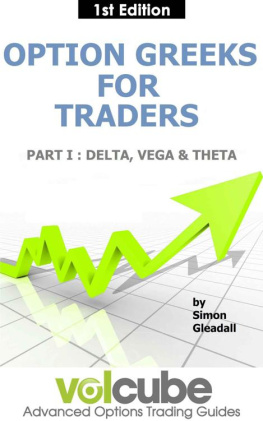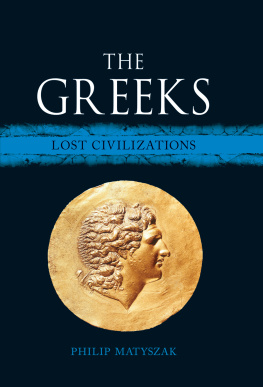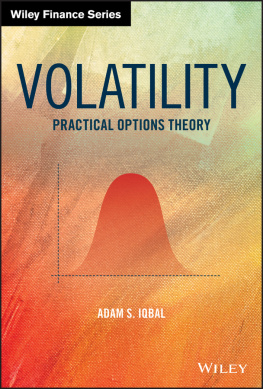OPTION GREEKS
FOR
TRADERS
Part I : Delta, Vega & Theta
Simon Gleadall
1st Edition
Volcube Advanced Options Trading Guides
2014 Volcube Ltd. All rights reserved.
Disclaimer
This book does not constitute an offer or solicitation for brokerage services, investment advisory services, or other products or services in any jurisdiction.
The books content, tools and calculations are being provided to you for educational purposes only. No information presented constitutes a recommendation by Volcube to buy, sell or hold any security, financial product or instrument discussed therein or to engage in any specific investment strategy. The content, tools and calculations neither are, nor should be construed as, an offer, or a solicitation of an offer, to buy, sell, or hold any securities by Volcube. Volcube does not offer or provide any opinion regarding the nature, potential, value, suitability or profitability of any particular investment or investment strategy, and you are fully responsible for any investment decisions you make. Such decisions should be based solely on your evaluation of your financial circumstances, investment objectives, risk tolerance and liquidity needs.
Options involve risk and are not suitable for all investors. Options transactions are complex and carry a high degree of risk. They are intended for sophisticated investors and are not suitable for everyone.
Table of Contents
About Volcube
Volcube provides a leading options education technology to firms and individuals who want to learn about professional options and volatility trading. The Volcube technology is a web-based option market simulator with embedded, automated teaching tools and a rich learning library.Volcube was founded in 2010.
Please visit www.volcube.com to learn more and try out Volcube for free.
About the author
Simon Gleadall is one of the co-founders of Volcube and has traded options and other derivatives since 1999. He works closely with the Volcube development team on upgrades to the simulation technology and also co-produces much of the original learning content. He can be reached via .
About the Volcube Advanced Options Trading Guides series
Clear and concise guides that explore more advanced options trading topics. Check out all the volumes in the series
volume I : Option Gamma Trading
volume II : Option Volatility Trading : Strategies and Risk
volume III : Option Market Making : Part I : An Introduction
volume IV: Trading Implied Volatility : An Introduction
volume V: Option Greeks for Traders : Part I : Delta, Vega & Theta
Introduction
The Greeks are fundamental to understanding how options behave; how their values, and risk profiles, change. Managing an options portfolio means managing the Greeks. Many of the trading opportunities embedded in options are channelled via the Greeks. Hedging option risk efficiently often means hedging particular Greeks or groups of Greeks. In short, option trading success is all but impossible without a rigorous understanding of the Greeks.
This volume of the Volcube Advanced Options Trading Guides series aims to explain the option Greeks as intuitively as possible. Whilst basic definitions may make some reference to mathematical formulae, this will be kept to a minimum. Rather, the focus is on the practicalities of the Greeks. How does the market talk about the Greeks? How do traders actually interpret and then act on their portfolios Greeks? To this end, examples will be in plentiful supply.
What are the Greeks? We can offer a fairly abstract definition: the Greeks are quantified estimates of changes to either option value or to other Greeks, with respect to a change in some other factor. Lets strip that definition down into something more tangible. We start with an option. Lets assume that this option has some value. This implies it has an amount of time left until expiration, its underlying product has a price presumably not a million miles away from the strike price and the spot product has some level of expected volatility in the future; in other words, a completely ordinary scenario for options that trade on thousands of products. Now, it is a safe assumption that the value of this option will change. It could change for many different reasons; perhaps the spot price moves or time passes or the expected volatility level falls. Or some other relevant factor may change; perhaps interest rates alter or the expected dividend on a stock changes. Things happen, the world turns and the options value is affected. For a trader, it would be nice to know in advance what these changes are going to be. But more likely than not, the trader has very little idea about what will happen. The next best thing to knowing what will happen, is to know how particular changes will impact on the options value . For instance, the owner of a call option knows that, in general, if the spot product rallies, his call becomes more valuable, but if the spot drops, the call loses value. He may not know which way the spot will move tomorrow, but it would be helpful to know exactly how big an impact changes in the spot are going to have on the calls value. To manage any risk, it is essential to have an idea about the magnitude of the risk . This is where the Greeks come in. They quantify the risk to an options value with respect to a change in another related factor. But the Greeks go further than this. Because the degree of risk for the different factors is not constant , it is necessary to understand how the risks themselves change when factors change.
Here is an analogy. Suppose you own a field and are considering sowing the field with seeds to grow a crop. You do not know with certainty what the weather will be over the coming seasons. But you may be able to quantify the risk to your crop with some estimates about how certain average temperatures lead to certain crop yields. Another risk measure might show the theoretical effect of average rainfall, another showing changes in yield with respect to the use of fertilizers etc. These would be equivalent to some of the basic option Greeks. However, suppose that these risk measures were themselves not constant. For instance, suppose that your measure of crop yield sensitivity to rainfall could change depending on the average temperature . This then is a further complication. Your farming Greeks may be helpful, but you would also need a second set of Greeks to deal with the potential changes to these basic Greeks. And possibly more Greeks again to deal with changes to the changes to the Greeks!
So, to recap, we start with an option and its value. This value is driven by a set of relevant factors, such as the time to expiry, the spot price etc. The Greeks tell us i) how changes to the value of the factors will affect the option value and ii) how changes to the various factors affect other Greek values. We make a distinction between 1st order Greeks (which relate specifically to changes to option value with respect to a change in some factor) and higher order Greeks which relate to changes to lower order Greeks. Using the 1st and 2nd order Greeks is very common, but the 3rd order (and even higher) can also be important to understand on occasion.
The same ideas can be expressed mathematically. The theoretical option value is a mathematical function of several factors. The partial derivative of this function with respect to any one of the factors, yields a 1st order Greek. Differentiating again (either with respect to the same factor or, cross-partially with respect to a different factor) yields a higher order Greek. Differentiating yet further can still derive useful Greeks.
Calculating the Greeks
There are two main methods for arriving at a value for a Greek. The first is to use a closed form equation. Mathematical formulae for the Greeks are available for benchmark pricing models such as Black Scholes. These have been derived by differentiating the main option pricing equation to yield the desired 1 st order Greek, and by differentiating again for higher order Greeks. Do not concern yourself if this beyond your mathematical understanding. In the same way it is perfectly possible to use a pricing model to value an option without entirely understanding how the model is derived, so too with the Greek formulae. There are several free online tools for computing the option Greeks. It is probably advisable to use more than one initially and ensure they tally. Or if your maths and/or coding skills are up to it, building one's own calculator is bound to be better still, providing it is accurate!
Next page






